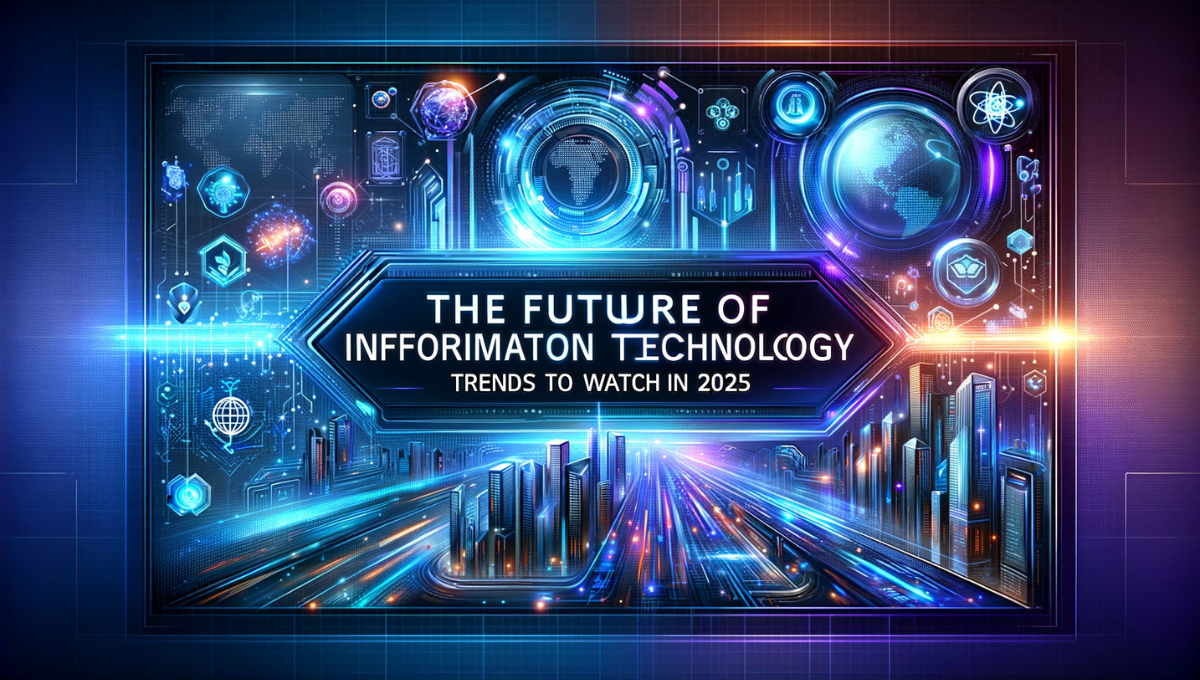Introduction
Information technology (IT) is evolving at an unprecedented pace, reshaping how businesses and individuals operate. In 2025, the IT landscape promises to bring transformative changes driven by emerging trends. Staying ahead in this dynamic field is crucial for businesses aiming to thrive in the digital age. This blog explores the key trends that will define the future of information technology and their impact on industries worldwide.
The Evolution of Information Technology
Over the past few decades, information technology has grown from basic computing systems to complex IT infrastructure supporting global industries. IT services have become indispensable, enabling companies to streamline operations, enhance productivity, and innovate. The integration of IT systems, coupled with advancements in software development, has created opportunities for businesses to scale efficiently.
In 2025, information technology continues to be a driving force behind enterprise technology and business innovation. Understanding the upcoming trends is vital for businesses to adapt and succeed in an increasingly competitive market.
Key Trends to Watch in 2025
1. Rise of AI and Automation
Artificial intelligence (AI) and automation are revolutionizing IT services and solutions. Businesses are increasingly adopting AI-powered tools to automate routine tasks, analyze data, and improve decision-making. For instance, AI-driven IT management systems can predict and resolve issues before they escalate, reducing downtime and boosting efficiency.
AI also enhances enterprise technology by enabling personalized customer experiences, optimizing supply chains, and supporting advanced analytics. As automation becomes more accessible, companies across various sectors will leverage it to stay competitive.
2. Growth of Cloud Computing and IT Infrastructure
Cloud computing continues to reshape IT infrastructure by providing scalable and cost-effective solutions. In 2025, businesses are expected to migrate more workloads to the cloud, reducing reliance on traditional IT systems. Hybrid and multi-cloud strategies will gain traction as companies seek flexibility and resilience.
Cloud-based IT systems offer several benefits, including enhanced collaboration, data security, and real-time accessibility. These solutions empower organizations to respond quickly to changing market demands, making them a cornerstone of modern information technology.
3. Cybersecurity: A Growing Priority
As businesses embrace digital transformation, cybersecurity becomes paramount. Cyber threats are evolving, and organizations need robust information technology solutions to safeguard sensitive data. In 2025, cybersecurity strategies will focus on proactive measures such as threat detection, endpoint protection, and zero-trust architectures.
IT consulting services will play a critical role in helping businesses strengthen their defenses. By implementing advanced security protocols, companies can build trust with their customers and protect their assets from cyber risks.
4. Expansion of Website Development and Software Development
Website development and software development are integral to the IT industry’s growth. In 2025, these fields will prioritize user-centric designs, faster performance, and seamless integration with emerging technologies. Businesses will invest in developing intuitive platforms that enhance user experiences and drive engagement.
Information technology companies will adopt agile methodologies and DevOps practices to accelerate software delivery. This trend ensures that businesses remain adaptable and responsive to market demands.
5. Focus on Sustainable IT Practices
Sustainability is becoming a key consideration in IT systems and infrastructure. Companies are adopting eco-friendly practices, such as energy-efficient data centers and green computing solutions. In 2025, the IT industry will emphasize reducing its carbon footprint through innovative technologies and sustainable practices.
Business technology will align with global sustainability goals, making it an essential factor for companies striving to meet environmental and corporate responsibility standards.
How These Trends Impact Businesses
The trends shaping information technology in 2025 offer businesses numerous opportunities to innovate and grow. For example:
- Improved IT Consulting: Companies can access expert advice to implement cutting-edge IT solutions, ensuring they remain competitive.
- Enhanced IT Infrastructure: Cloud computing and sustainable practices will drive operational efficiency and cost savings.
- Innovative Business Technology: AI, automation, and advanced software development will empower businesses to deliver superior products and services.
By staying informed and proactive, businesses can leverage these trends to enhance their operations and achieve long-term success.
Future Challenges and Opportunities in Information Technology
While the future of information technology is promising, challenges remain. Skill gaps in emerging technologies, increasing cybersecurity threats, and regulatory complexities pose significant hurdles. However, these challenges also create opportunities for innovation and growth.
Information technology solutions will address these issues by offering advanced tools and resources. For instance, IT consulting firms can help businesses navigate regulatory landscapes and adopt best practices. Companies like Brysona provide comprehensive IT services, ensuring organizations stay ahead in a rapidly changing environment.
Conclusion
The future of information technology is filled with potential, driven by trends like AI, cloud computing, cybersecurity, and sustainable practices. Businesses that embrace these innovations will position themselves as leaders in their industries. By leveraging expert guidance and investing in advanced IT infrastructure, companies can navigate challenges and unlock new opportunities in 2025 and beyond.
Stay proactive and informed—the evolution of information technology waits for no one. Are you ready to embrace the future?

